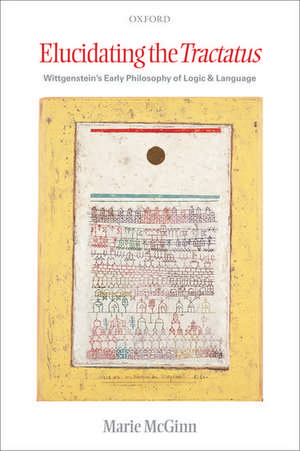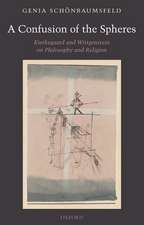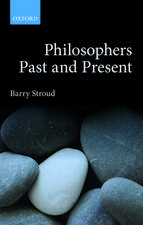Elucidating the Tractatus: Wittgenstein's Early Philosophy of Logic and Language
Autor Marie McGinnen Limba Engleză Paperback – 6 aug 2009
| Toate formatele și edițiile | Preț | Express |
|---|---|---|
| Paperback (1) | 318.57 lei 31-37 zile | |
| OUP OXFORD – 6 aug 2009 | 318.57 lei 31-37 zile | |
| Hardback (1) | 373.86 lei 31-37 zile | |
| OUP OXFORD – 16 noi 2006 | 373.86 lei 31-37 zile |
Preț: 318.57 lei
Nou
Puncte Express: 478
Preț estimativ în valută:
60.96€ • 63.64$ • 50.45£
60.96€ • 63.64$ • 50.45£
Carte tipărită la comandă
Livrare economică 25-31 martie
Preluare comenzi: 021 569.72.76
Specificații
ISBN-13: 9780199568246
ISBN-10: 0199568243
Pagini: 332
Dimensiuni: 156 x 234 x 20 mm
Greutate: 0.52 kg
Editura: OUP OXFORD
Colecția OUP Oxford
Locul publicării:Oxford, United Kingdom
ISBN-10: 0199568243
Pagini: 332
Dimensiuni: 156 x 234 x 20 mm
Greutate: 0.52 kg
Editura: OUP OXFORD
Colecția OUP Oxford
Locul publicării:Oxford, United Kingdom
Recenzii
Review from previous edition A highly interesting contribution to the debate on Wittgenstein's philosophy... [McGinn] has done an important job in showing how a reading that accepts as its starting point Diamond's critique of the traditional interpretation is perfectly capable indeed, well positioned to describe the Tractatus as a contribution to logic and the philosophy of logic... with respect to its elucidation of the Tractatus' views on logic, McGinn's book is pretty much the book on Wittgenstein's early philosophy I always wanted to read as a student, but was never able to find... Happily, the book did not come too late for me, and it is certainly not only recommended reading for students. Not only did I learn a great deal from this book, but reading it was also a pleasure.
There is much to like and admire about the way in which McGinn carries out [her] interpretation...[A] systematic account...which has much to recommend it.
an excellent and highly original contribution ... one that it is hard to imagine being surpassed anytime soon. It makes for an illuminating and enjoyable read.
There is much to like and admire about the way in which McGinn carries out [her] interpretation...[A] systematic account...which has much to recommend it.
an excellent and highly original contribution ... one that it is hard to imagine being surpassed anytime soon. It makes for an illuminating and enjoyable read.
Notă biografică
Marie McGinn is Professor Emeritus at the University of York.















